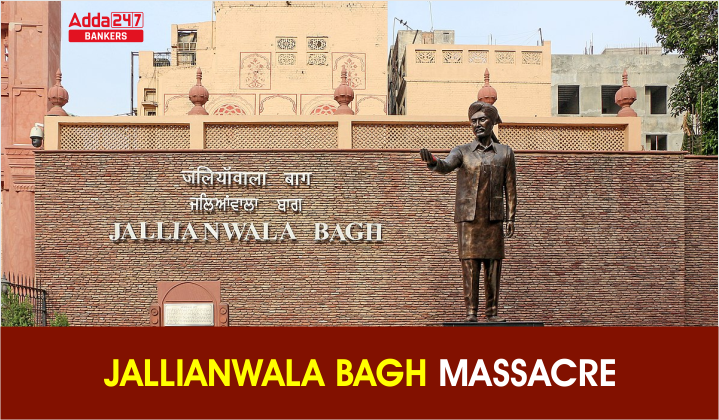Jallianwala Bagh Massacre
Each year 13 April brings back to memory one of the coldest and most hash incident of cold-blooded mass murder. This incident was described as “unutterably monstrous” by none other than Winston Churchill. On April 13 thousands of innocent men, women and children were gunned down at Jallianwala Bagh. The Jallianwala Bagh massacre, also known as the Amritsar massacre, was one of the redefining moments in the Indian Struggle for Independence. The article below has all the information on Jallianwala Bagh Massacre and its Causes, History & significance.
Jallianwala Bagh Massacre Causes
The British Government had brought two restrictive and colonist acts known as Rowlatt Acts, These acts greatly hindered civil liberties and promoted wartime measures in day-to-day life. It was against these Balck Acts, Gandhi Ji had called for peaceful protest. Punjab which was under then Governor Sir Michael Francis O’Dwyer was not prepared to let people organise protests. The state of Punjab imposed martial law and two prominent leaders Saifuddin Kitchlew and Satyapal were arrested. Against these arrests and in absence of clear communication related to martial law a large, peaceful crowd had gathered at Jallianwala Bagh.
Brigadier General R. E. H. Dyer who was a core imperialist sought to teach innocent people a lesson. On his orders, the protesters were surrounded by troops from the British Indian Army, including Gurkha, Baloch, Rajput, and Sikh soldiers from the 2-9th Gurkhas, the 54th Sikhs, and the 59th Scinde Rifles. On the order of General R. E. H. Dyer, the troops opened fire on a peaceful crowd.
This incident led to the massacre of thousands of men and women including children. The high hardness of Brigadier General R. E. H. Dyer shook the faith of Gandi Ji in the British administration. Hence began a new era of peaceful and just struggle against as “Satanic Regime” as opposed to earlier struggle via constitutional means.
जलियांवाला बाग नरसंहार (Jallianwala Bagh Massacre), जानें जनरल डायर ने कैसे ली हजारों की जान
Significance of the Jallianwala Bagh Massacre
The Jallianwala Bagh massacre holds significant historical importance due to several reasons:
- Turning Point in India’s Independence Movement: The Jallianwala Bagh massacre was a significant turning point in India’s struggle for independence from British colonial rule. It served as one of the catalysts for Mahatma Gandhi to launch the Non-Cooperation Movement, his first extensive and ongoing campaign of peaceful protest (satyagraha) from 1920-1922.
- Mahatma Gandhi gave up the title of Kaiser-i-Hind, bestowed by the British for his work during the Boer War.
- Brutality of British Colonial Rule: The massacre exposed the brutal and oppressive nature of British colonial rule in India.
- Impact on Indian Politics and National Consciousness: It led to increased unity and solidarity among Indians across religious, caste, and regional lines, as people came together in their shared outrage against the British government’s brutality.
- International Attention and Press Coverage: It garnered condemnation from around the world and led to increased pressure on the British government to address the grievances of the Indian population.
- Following the massacre, Rabindranath Tagore, a Nobel Prize-winning poet from Bengal, returned the knighthood he had been awarded in 1915 as a form of protest against the British government’s actions.
Jallianwala Bagh Massacre and Hunter Commission
After the tragic Jallianwala Bagh shootings, the Government of India established a committee of inquiry known as the Disorders Inquiry Committee, with Lord William Hunter as its chairman, along with Indian members. The committee’s final report, submitted in March 1920, unanimously condemned General Dyer’s actions.
However, it is worth noting that despite the condemnation, the Hunter Committee did not impose any penal or disciplinary action against General Dyer for his role in the massacre.
Despite the passage of time, Britain has not issued an official apology for the Jallianwala Bagh massacre. In a recent statement, former British Prime Minister Theresa May referred to the incident as a “shameful scar” on British Indian history but did not go as far as offering a formal apology. The Labour Party in Britain has been advocating for a formal apology, emphasizing that the victims of the massacre deserve a “full, clear and unequivocal apology” for the tragic event.
| Important Days |
| World TB Day |
| Blindness Prevention Week |
| World Autism Awareness Day |
| World Vaccination Day |
| World Water Day |





 GA Capsule for SBI Clerk Mains 2025, Dow...
GA Capsule for SBI Clerk Mains 2025, Dow...
 The Hindu Review October 2022: Download ...
The Hindu Review October 2022: Download ...
 Test Prime Subscription by Adda247
Test Prime Subscription by Adda247


